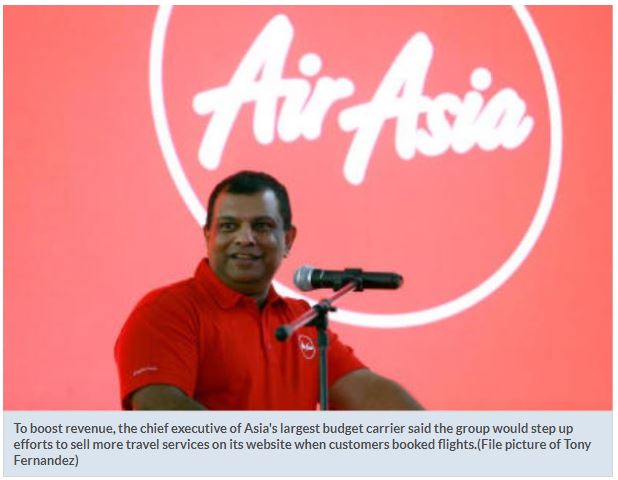Malaysia: AirAsia falls to first quarterly loss since 2015 as fuel costs rise
KUALA LUMPUR: AirAsia  Group Bhd flipped to a net loss in the fourth quarter, its first quarterly loss in more than three years as higher fuel prices and operating lease costs dented income.
Group Bhd flipped to a net loss in the fourth quarter, its first quarterly loss in more than three years as higher fuel prices and operating lease costs dented income.
To boost revenue, the chief executive of Asia’s largest budget carrier said the group would step up efforts to sell more travel services on its website when customers booked flights.
AirAsia posted a bigger than expected loss of 395 million ringgit ($97 million) for the period, versus a 372.6 million ringgit profit a year earlier. Refinitiv data showed one analyst had forecast a 63.2 million ringgit loss.
Malaysia’s flagship budget carrier said in a stock exchange filing that fuel consumption rose 12 percent and its average price climbed 33 percent to $92 a barrel in the three months to Dec. 31. Fuel costs rose 48 percent to 1.1 billion ringgit.
Operating lease expenses rose 115 percent to 413.4 million ringgit, after AirAsia sold and leased back aircraft.
Revenue grew 6.2 percent to 2.82 billion ringgit, as total passengers carried by the airline swelled 16 percent to 12.1 million, although this trailed a 21 percent capacity increase.
The passenger load factor for the period, a measure of how full planes are, fell 4 percentage points to 84 percent.
The airline said the rise in fuel costs had a major impact, saying it had hedged 52 percent of its 2019 needs at $63.41 a barrel for Brent. Brent crude traded around $65.75 on Wednesday.
AirAsia said it was seeking to reduce costs with new technology and said it also expected airport expenses to fall.
CEO Tony Fernandes said the group aimed to offer more hotel bookings, tours and insurance via the airline’s website.
“We believe that this platform has enormous potential and will generate a significant increase in revenue for the group,” he said in a statement.
AirAsia signed a memorandum of cooperation in December with Vietnamese partners to set up a lowcost carrier.
Fernandes said this was the “last piece” in its network of joint ventures that aim to connect passengers to north Asian nations such as China, Korea and Japan.
($1 = 4.0640 ringgit) – Reuters


 English
English




